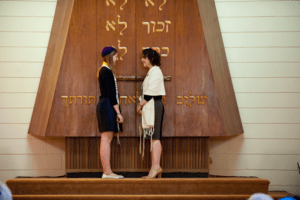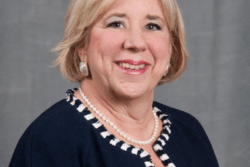My (Eloquent, Intelligent, and Inspiring) Rabbi
Rabbi Emily Mathis always seems to know the right thing to say. I remember being a little girl looking up at her on the Bimah during Friday night services, and wondering how she produced such beautiful and meaningful speech. I had the opportunity to speak with her recently, and I found myself wondering how she was able to answer so many of my questions before I had even asked them. Every time I get the chance to talk to my Rabbi, I am lucky enough to learn something new about, and from her.
Rabbi Mathis grew up in Clayton Missouri, a suburb of St. Louis, which she views as having a strong Jewish community. She describes her Jewish life as a kid as being less about religion and more about “the Jewish way of doing things.” For example, she laughingly told me that her family never had a dog because “Jews don’t have pets.”
When she started college at Brown University, it wasn’t a given that she would become a Rabbi. Her parents nudged her towards the Hillel by telling her that it had a piano, but she was more interested in feminism and environmental issues than Judaism. She did, however, start to uncover more of her own spiritual identity by attending Quaker meetings after she met another student who identified as a “Quaking Jew.” This wasn’t a shift away from Judaism, but a new way of experiencing it that was more “soulful and social-justice-y.”
In the summer of 1986, Rabbi Mathis stumbled upon the person who would draw her into the Judaism of her adult life. While doing a survey for the environmental science department, she knocked on the door of Rabbi Flam, Brown’s Hillel director. Rabbi Mathis had still never stepped foot in the Hillel, but she offered to babysit for the Rabbi, and he and his family eventually became like family to her. Rabbi Flam helped her to forge a deeper connection with Judaism, and gave her a heightened sense of Jewish family life. She defines this as one of the three things that began to propel her towards becoming a Rabbi, along with joining a women’s Talmud study group and a synagogue in St. Louis. This synagogue was focused on social justice and had great music, both of which were very important to her, and they were explicitly open to lesbian and gay Jews, which made her feel welcome as a lesbian woman. In all of these places, Rabbi Mathis found what she calls “a lived community Jewish life,” a sentiment that is deeply reflected in what she brought to my temple as our Rabbi.
There was a period of a few months before my Bat Mitzvah when I thought I might be a Rabbi when I grew up. This inkling was in no small part thanks to Rabbi Mathis. The lessons I learned from her helped me take joy and value from my Jewish education, and continue to inform who I am as a Jew and as a person. Hearing the stories of her spiritual journey has shown me both how much I have in common with her, and, if my Jewish experience in college and beyond is anything like hers, how much more growth and self-discovery I still have ahead of me.
When I asked Rabbi Mathis about how feminism connects to her Jewish identity, she replied that it was woven into her DNA, a product of being “raised on whole wheat bread and recycling.” As the budding feminist who had to go to a neighbor’s house to get my hands on things like white bread and sugary cereals, I can certainly relate. She went on to say that her two biggest motivations for becoming a rabbi were her deeply ingrained sense of feminist identity, and the love of Jewish text and tradition she found later on. To me, feminism and Judaism can sometimes seem at odds with one another, and it can be difficult to balance the two identities when they come into conflict. Rabbi Mathis recalls a similar struggle as she developed her Jewish identity, and had to balance the two before she was ready to go to rabbinical school.
As someone who is responsible for teaching people about Judaism and helping them discover their own Jewish values, Rabbi Mathis says that feminism helps her to act in a more intersectional way: “meeting them where they are” in terms of Jewish education or identity. She recognizes that people aren’t always sure how Judaism fits into their lives, and strives to teach in a way that is inclusive and integrates as many different voices and traditions as possible. At home, She and her partner Halle have three daughters, and Rabbi Mathis says that she wants her daughter Nina, who’s in first grade, to have a real feeling of soulfulness and connection in her Jewish education. She described a moment during services with Nina as follows: “I saw Nina up there looking at the Rabbi,” she told me, “and I thought, this is her Rabbi. She has a relationship with this person.” I couldn’t help but laugh at how perfect the word choice was, because only a few hours earlier I had been explaining to my mother that, although Rabbi Mathis no longer works at our temple, she will always be “my Rabbi.”
This piece was written as part of JWA’s Rising Voices Fellowship.







